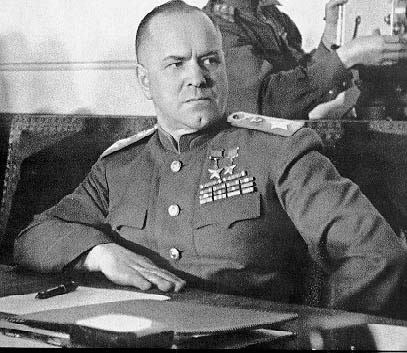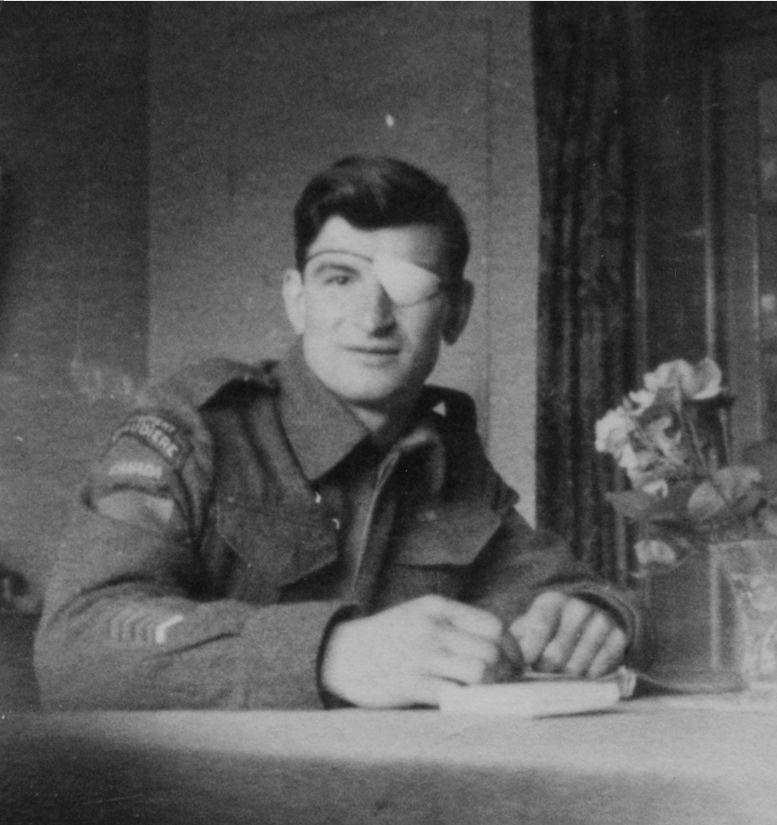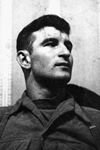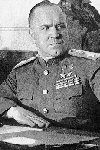The Battle Fronts
By Maj.-Gen. Sir Charles Gwynn, K.C.B., D.S.O.
The War Illustrated, Volume 7, No. 162, Page 194-195, September 3, 1943.
When I wrote last it was clear that the initiative had passed to the Russians and that the Germans were in danger of a major disaster if they decided to cling to Orel at all costs; the capture of Orel constitutes a notable Russian victory, and though the German retreat was carried out skilfully it cost them heavy losses and necessitated the use of all available reserves to keep the Russian pursuit in check. Doubtless this involved a transfer of formations from the Byelgorod front and gave Zhukov a chance of delivering one of those brilliantly timed blows which had been such a feature of his winter offensive.
It looks as if it took the Germans by surprise and the resulting break-through has placed them in a position even more critical than it was when the exceptionally early thaw came to their aid in the winter. The attack cannot have been merely a brilliant improvisation, which could hardly have been exploited so ragidly and fully. But is is amazing that Zhukov after the great defensive battle waged for the Kursk salient should have been left with a force sufficient to seize the opportunity. It will be disappointing if the Byelgorod break-through does not presage ultimate decisive victory.
The week that saw the fall of Orel, Byelgorod, Catania and Munda mat prove to gave opened up new vistas which will lead to modification of Allied plans. The capture of Sicily can be regarded only as a preliminary step.
Russia
Once again Russia has surprised in falsifying all expectations. Last winter the initial success of her offensive, though surprisingly great, was to some extent due to the strategical mistakes of the enemy which presented a great opportunity, and winter conditions were in her favour. What really amazed military observers all over the world was the astonishing competence of the administrative organization which enabled the momentum of the offensive to be maintained with the most inadequate communications, fat beyond the range at which it was thought it must be lost. The campaign gave convincing proof of how formidable the Red Army was under winter conditions; but it did little to shake the belief that in summer the Reichswehr would assert its superiority when it regained its mobility.
When the German Kursk offensive opened there was an almost universal expectation that the belief would be justified, and the complete failure of the attack, in spite of the formidable character of the force employed, had to be explained by the admitted courage and tenacity of Russian troops in defence. Nevertheless, the success of the defence especially after the defences in the Byelgorod area had been penetrated, caused great surprise; and for the first time German invincibility in offensive action became open to doubt. Few, however, believed that the Russians would be capable of repeating in the summer their winter successes.
The comparatively slow progress of the attack on the obviously exposed Orel salient seemed to indicate the limits of their offensive capacity and gave little hope that they would ever be capable of breaking through the main German defensive positions. Even so, the fact that the Germans, in spite of great efforts, were unable to bring the Russians to a standstill caused surprise.
Then came the greatest surprise of all – the break-through at Byelgorod followed by its rapid exploitation. Here was something entirely new, vitally affecting prospects in the remainder of the summer campaigning season. It was a success which could only be explained by a definite superiority of the Russians both in generalship and in power of manoeuvre.
It could hardly be argued that the Germans must have been caught on the rebound, after the failure of their offensive, for Byelgorod had for months been a strongly-defended position and formed an ideal rallying line. Even if the Germans had weakened their hold on it by transferring picked formations to the Orel front, there should have been ample reserves available to relieve them; for there must certainly have been a considerable concentration of less mobile troops assembled to support the original offensive spearhead. The break-through was effected, therefor, not a weak but a strong point in the enemy's front, and was, consequently, all the more important in its implications. It was a soft spot, only in the sense that a successful break-through reached a particularly sensitive area in the enemy's rearward organizations, and had major strategical results.
When the Byelgorod break-through was followed by the penetration of the German defences between Smolensk and Bryansk, again a sector where they might have been expected to be exceptionally strong, a still further proof was give of Russian offensive power.
In the winter campaign, when the German situation was at its most critical, the Russians were desperately handicapped in their attempts to give the decisive blow by the immense length their lines of communication, entirely dependent on motor transport, had reached, and by the retarding effects of snow on movement. The weight of their forward thrust was consequently reduced. Moreover, the approaching thaw gave the Germans prospects of a period of respite, and encouraged them to hold on at all costs to dangerously exposed positions, rather than attempt difficult retreat which might otherwise haven been inevitable.
Now the Russian base of operations has been immensely advanced and has a restored railway system to supply it. They are, therefore, in a much better position to exploit initial successes, both by weight of blows and by speed of movement over firm ground; and the Germans can expect no respite.
With the initiative lost, and their lateral lines of communication threatened, the German problem, always inherent in defensive operations, myst be that of moving reserves to the threatened points, and unless they can concentrate reserves for counter-attack on a great scale their situation is extremely precarious. If they are compelled now to carry out a withdrawal to a shorter defensive line, the evacuation of warlike stores from their forward areas will be immensely difficult. Moreover, they must be saved, not merely to prevent them falling into Russian hands but in order to fill the depots on a new defensive line. It is highly improbable that any position far in the rear is well stocked, and to stock it rapidly from home bases would, on account of the great distances and limited railway facilities, be a slow business. Retreat on a large scale would in particular involve an immense expenditure of petrol supplies difficult to meet.
Sicily
The capture of Sicily, giving us practically complete control of the Mediterranean route, proving the practicability of large-scale amphibious operations and providing us with new air bases, was undoubtedly a vitally important preliminary step. There has been some disappointment that, during the time required to clear the island, further operations for which preparations had obviously been made were not undertaken. It is, however, impossible for anyone without the fullest knowledge of resources available, of the political factors involved, and of the full scope of the Allied plans, to offer any explanation of the apparent inaction.
The occupation of the island has clearly caused a notable disturbance of the dispositions of the enemy's troops; and it must be realized that it would have been quite impracticable to forestall the German occupation of the Lombardy plain. Whether it was ever the intention of the Allies to undertake a complete occupation of Italy, involving immense demands of shipping, is I think, doubtful; and it is possible that the success of the Russian offensive may make it less, rather than more advisable.
The actual fighting in the island followed the course expected, once it was apparent that the enemy, though he had failed to counter-attack in strength, was determined to play for time. The terrain gave exceptional opportunities for delaying action and made it impossible to take full advantage of the Allied superiority in numbers and armament. Only highly-trained and determined infantry could have overcome the especially difficult obstacles encountered.
Catania might possibly have been taken by a frontal attack, under cover of an artillery barrage; but the cost would have been heavy and the chances of failure were considerable. In any case, the greater portion of the garrison would almost certainly have escaped to continue their resistance in the defiles beyond. It was, therefore, in this case, undoubtedly correct to evict the enemy by manoeuvre.
What the enemy's object was in fighting so desperately for time is still not quite clear. Possibly it was merely to gain time to assemble craft for evacuation, and for the concentration of anti-aircraft defences; but probably there were other political and strategic motives which presently will be revealed in yet more triumphant action.
Previous and next article from The Battle Fronts
The Battle Fronts
On May 6, 1943, the battle of Tunisia was decisively won by a blitzkrieg attack following on a series of desperate encounters in which the enemy's troops were exhausted and his reserves expended. The
The Battle Fronts
It is high time to stop using the term Second Front. It has long ceased to be accurate, though it conveniently defined out strategic aims. Now that those aims have taken concrete shape we should, I
Index
Previous article
I Was There! - My Night of Terror in Bomb-Battered Hamburg
On the night of July 24, 1943, in an attack lasting 50 minutes, the R.A.F. dropped 2,300 tons of bombs on Hamburg, greatest port in Germany. Dr. Wieninger, a Nazi reporter, described his night of terr
Next article
The War at Sea
The latest results of the war against the U-boats, announced in a joint statement by the Prime Minister and President Roosevelt on August 14, are the equivalent of a great sea victory. Over a per







